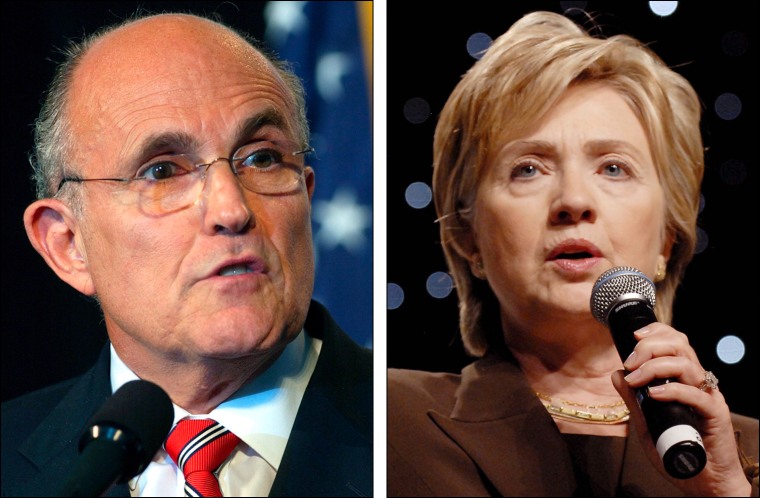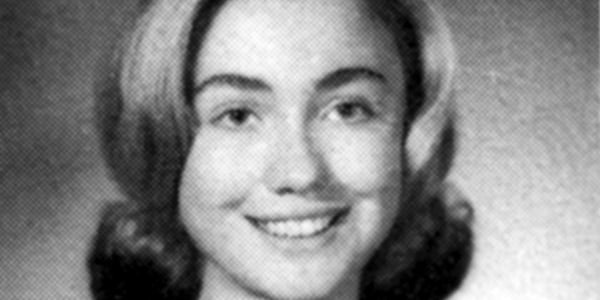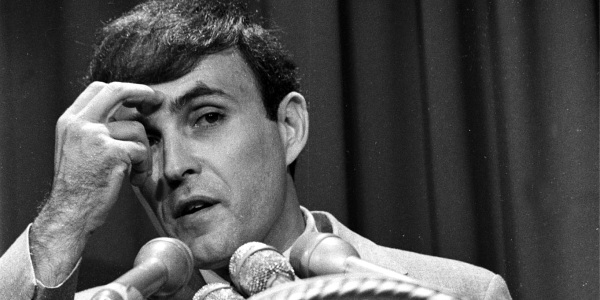If the presidential campaign seems as if it is going by in a blur, perhaps it is because the two frontrunners want it that way.
However, it is not the speed of Hillary Clinton’s and Rudy Giuliani’s campaigns causing that blur.
Instead, it is the distinctions.
Should both (or either) Clinton and Giuliani go on to win their respective nominations, it will be largely because of the candidate’s ability to blur the distinctions their challengers are trying to create.
A successful challenger's campaign is about drawing distinctions. A successful frontrunner's campaign is about blurring those differences.
Clinton's challenge for this campaign has been to blur the distinctions on the war – not talk about where she was in 2002 but instead talk about what she's going to do in 2009.
Slideshow 53 photos
Hillary Clinton
Her chief opponent, Barack Obama, has desperately tried to turn this campaign into a referendum on her 2002 vote, or even her 2003 praise of the Iraq effort, as proof she's been more finger-in-the-wind on Iraq than a leader should be.
Of course, in response to that, Obama opponents (including Clinton and John Edwards) like to point to a quote from Obama in 2004 when he admitted that he didn’t know how he would have voted on the Iraq resolution.
At the time, of course, Obama was campaigning for the Kerry-Edwards ticket and attempting to justify why he was supporting them even though both senators voted for the 2002 war resolution.
Who represents change?
But it's not just the subject of the war where Clinton is succeeding in blurring distinctions with Obama or Edwards. On a more thematic front, the Clinton campaign has done a good job to date on blurring the distinctions on who best represents change.
Obama's campaign believes his candidacy alone screams change because a) he's the first non-white plausible nominee ever and b) his last name is neither Bush nor Clinton.
But camp Clinton hasn't allowed Obama's "turn the page" for change frame take hold.
Instead, the Clinton message on this front is to spell out the differences she has with President Bush.
It accomplishes two things. First, it makes the Clinton-Bush comparison more difficult for Democratic primary voters to accept. Second, by contrasting with Bush, Clinton has an opponent Democrats love to hate.
On the Republican side, Giuliani is winning in part because he has done a solid job blurring conservative distinctions.
Via an underground campaign of sorts – including talk radio, direct mail and surrogate campaigning – the Giuliani campaign has been all about erasing the concern that he is not a conservative.
Giuliani's trump card with GOP primary voters is the war. There is not a bit of distinction Mitt Romney, Fred Thompson or John McCain can draw with Giuliani on this issue.
And according to our polling data, more Republicans care about this issue than any other.
So the distinctions Giuliani's opponents are trying to draw are on issues many GOP voters care about – for example social and moral issues – but not issues the MAJORITY of GOP voters care about.
Herein lies Giuliani's built-in advantage. On paper, he's clearly not the most traditionally conservative candidate the party could nominate. But on the number one issue for GOP primary voters, he is.
Two distinctions Romney is trying to draw have yet to draw blood on Giuliani.
The first is immigration. Romney has taken not-so-subtle digs at Giuliani for making New York City a so-called "sanctuary city."
On this issue, Giuliani has been somewhat successful in blurring the distinctions. Like Clinton does with Obama on the war, Giuliani chooses not to talk about the past but instead to simply talk about present: the problem of "sealing the border." It has worked so far. Let's see how it plays out in paid advertising.
The second distinction Romney is attempting to draw is about his family and Giuliani's, subtly implying his is wholesome while Giuliani’s is not.
Slideshow 28 photos
Rudy Giuliani
He doesn't do this directly. For instance, earlier this week the Romney campaign launched a separate web site just for is wife, Ann. The campaign is hoping folks like us pick up on this and make comparisons between Ann Romney and the wives of both Giuliani and Thompson. Each have drawn criticism for getting too involved in their husbands’ campaigns.
But so far, neither distinction has stuck for Romney. And if neither ever does, he'll never be the nominee.
Why me?
For a challenger to defeat a frontrunner, he or she has to successfully make the case of why me, which arguably Obama, Edwards, Thompson and Romney have all done fairly well.
But a challenger must also make the case for why it shouldn’t be the other guy, which none of the four top challengers has done well.
I hear criticism from within these challenger campaigns questioning why the media doesn't go after Clinton and Giuliani more. But campaigns that wait for the media to do their job for them never succeed in the long run.
The media isn't going to take down Clinton or Giuliani (though many of THEIR supporters will believe otherwise). The media WILL cover attempts by other campaigns to take down the incumbents.
But so far, none of the challengers has done a good job of creating the necessary distinctions while the two frontrunners have done a remarkable job of blurring the lines.
If Clinton and Giuliani keep it up, they will be the nominees.
And the whole primary campaign will seem like a blur.


